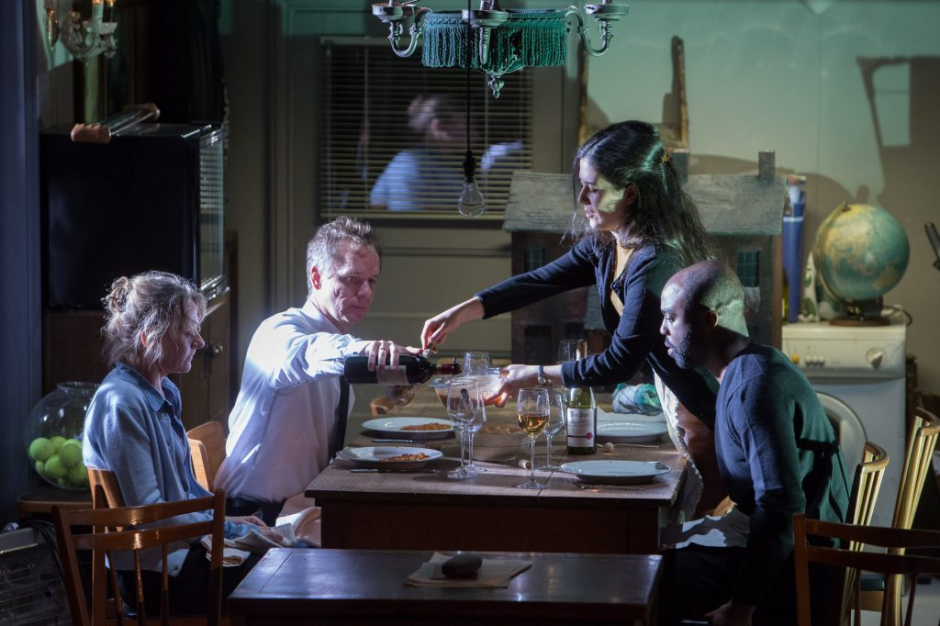Ghosts, directed by Polly Findlay, HOME; November 23 2016.
Niamh Cusack is playing Helen Alving. She casually leans against a door frame, drinking milk from the carton that she’s taken from a fridge, as she watches the local priest, Pastor Manders (Jamie Ballard) simultaneously be conned into believing he is to blame for a fire at a newly built orphanage and pay out a bribe so that his fabricated culpability is covered up. Later, echoing Helen Alving’s gesture, Norah Lopez Holden’s Regine Engstrand stands by the same fridge drinking orange juice from the carton as she watches the family she has waited on fall apart. This echoing is a wonderful theatrical moment in Ibsen’s greatest play, and perhaps the highpoint of this production where so much is unfolded psychologically by silent gesture.
Ghosts tells the story of the Helen Alving. Her husband, Captain Alving, a pillar of the community, is dead, and she has invested what he left behind in an orphanage on which construction has just been completed as the play opens. Meanwhile, her artist son, Osvald (Ken Nwosu), has just returned home where he seems to be striking up a relationship with the Alvings’ maid, Regine. Pastor Manders is managing the orphanage but is in love with Helen. And Regine’s father, Jacob Engstrand (William Travis), a carpenter, is hoping to open a thinly disguised brothel in the harbour. And of course, there are secrets here. It turns out Captain Alving was hardly the upright citizen he seemed but a philandering alcoholic. Ibsen imagines all the hypocrisies and sins of the bourgeoisie coming back to haunt them in the form of incest, syphilis, corruption, greed and malice. It’s vicious but it’s also uncanny, since what is uncanny is what is in the home, hidden, unconscious, which should never have been brought to light.
This doubling of Helen and Regine is uncanny too. It offers a bleak vision of the future, that ghosts are not only what haunt the present, but walk amongst us, haunting the future too, transmitting that hypocrisy and corruption like syphilis. It’s a typical detail of psychological interpretation in a production where little gestures and quiet words are given much weight. Secrets are discovered by characters that look on at the action from dark corners, unsignalled, demanding the audience do the interpretative work. And particularly in the second half of the play, the unsettling, creepy atmosphere of Ibsen’s domestic dramas comes to life, in the inscrutable, expressionist symbolism of the sun rising as Osvald’s mind succumbs to syphilis, and in the glee with which Regine greets the fire as an escape from so much that is stifling her. Indeed, Lopez Holden is worth singling out here, for her portrayal of the cruelty with which she meets Osvald’s syphilis, her coldness again expressed gesturally, and compelling.
Less convincing were Manders and Jacob Engstrand who were played for a sort of broad comedy that wasn’t especially satisfactory. The jokes weren’t dark enough and tended to break the atmosphere of moral contamination and malaise. Manders’ schoolboy bearing tended to lessen the satire of his hypocrisy since he hardly seemed capable of offering the deception of a stern Protestant or a moral compass of the town for the play to undermine. Indeed, his hypocrisy seemed practically innocent, such a naïf was he.
This perhaps wasn’t entirely the actors’ faults since the adaptation from a literal translation, by David Watson, was a mess, particularly in the first half. Jacob Engstrand got few lines at first other than a steady stream of ‘fucking’s that seemed to have been inserted in a frankly embarrassing attempt to make the play “more modern”. The script was significantly better in the second half when it actually started to sound like Ibsen. It’s perhaps something playwrights ought to be more aware of – when you try to improve on the master you very rarely succeed.
This attempt to ‘modernise’ Ibsen was the thorn in the side of the production throughout and threatened to undermine the careful psychological direction of the actors. It simply didn’t work. Ghosts, like most of Ibsen’s plays, depicts a very specific world which is not our own and attempts at modernisation tend to fail unless they are wholesale reworkings like Arthur Miller’s All My Sons or Satyajit Ray’s Ganashatru. This production was, swearing aside, Ibsen’s text, but inexplicably put in a house that seemed to exist in a temporal zone between the 1970s and now – Stromae on the radio but a two-bar electric fire as an important prop. The set was also rather frustrating with several areas where sightlines were blocked and with the action only visible from certain parts of the auditorium. This was presumably in imitation of Katie Mitchell’s innovative stagings of Ibsen and Chekov, but lacked her experimental use of video technology to fill in the gaps or robust intellectual approach to the material. Here, you just couldn’t see.
In a play about almost microscopic psychological nuance consistency is vital, and to hear debates about whether there would be gossip if a religious orphanage was insured because it would imply a lack of faith in God, or assertions that syphilis is incurable, were just distractions with this setting. It also raises the question ‘why the constant demand to give us a contemporary Ibsen?’ No doubt the main answer is that marketing departments like it, but it also suggests a sort of lack of real experimentation or intellectual interrogation of the material, ‘let’s just make it modern’, which did a disservice to the careful direction and work of the actors. Ibsen is modern but he is not our contemporary. One ghost that was missing from this production was the ghost of Ghosts. Ghosts is the modernity that made our contemporary world. It isn’t the same as us, but it haunts us.

